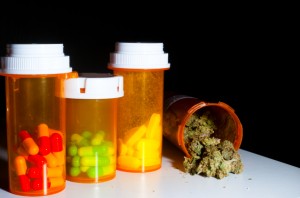 Marihuana (or cannabis) has been used in medicine for thousands of years. Although in the past century its recreational use has been outlawed, many countries have been researching marihuana for its medical purposes. It has been found that marihuana can provide cancer patients undergoing chemotherapy relief from nausea, vomiting and also help increase appetite. Marihuana has additionally been known to act as a muscle relaxer, a pain reliever and an aid to those who suffer from anxiety. Many of those suffering from illnesses prefer medical marihuana as a natural approach to healthcare.
Marihuana (or cannabis) has been used in medicine for thousands of years. Although in the past century its recreational use has been outlawed, many countries have been researching marihuana for its medical purposes. It has been found that marihuana can provide cancer patients undergoing chemotherapy relief from nausea, vomiting and also help increase appetite. Marihuana has additionally been known to act as a muscle relaxer, a pain reliever and an aid to those who suffer from anxiety. Many of those suffering from illnesses prefer medical marihuana as a natural approach to healthcare.
In Canada, medicinal marihuana is currently legal only if prescribed by a physician. There are hundreds of companies each month applying for licenses from Health Canada to legally grow marihuana, and alongside them are investors waiting for the right moment to put money into these companies. As with any prescription drug which requires pharmaceutical quality assurance, medical marihuana requires quality assurance testing for its potency and effectiveness to ensure that it meets standards set by Health Canada.
Standards for Growing Medical Marihuana
Marihuana plants undergo strict anti-contamination procedures throughout the entire growing stage. Contamination is taken seriously at marihuana growing facilities. Workers wear jumpsuits, which some companies actually require employees change when they enter and exit rooms. Mould is a prominent health issue that marihuana growing companies must rigorously check for. Some companies prefer to use gamma radiation to effectively kill mould and mould spores, although this practice is not always preferred due to the potential for gamma radiation to destroy essential oils which play a crucial synergistic role for the body. Medical marihuana quality assurance training has become standard to ensure that product leaving the company follows the same health standards as any drug sold on the pharmaceutical market.
Testing the Product
Medical marihuana growers are required to send their product to a third party for lab inspection. Here, the marihuana will be tested for mould, chemical residue, pesticides, bacteria or fungus. Quality assurance testing will focus mainly on the amount of cannabidiol (CBD) and tetrahydrocannabinol (THC) in the plant. The level of THC can determine the plant’s medical usage, with higher levels of THC better for certain treatments, and lower levels better for others. Dried marihuana buds are also tested for the presence of fungi, salmonella, E. coli, lead, mercury and arsenic. Quality assurance will also check for any bugs in the product.
Along with the physical work of testing the product, quality assurance must have the proper training to complete the reports which document that the product is safe for sale and medical use. As of now, there are no healthcare regulations for how a growing facility must be run. What Health Canada concerns itself with is that companies are following their safety and assurance procedures.
If you have an interest in working in this new and developing industry, earning your medical marihuana quality assurance certificate can provide you with a quality assurance career helping thousands in Canada receive the medication they need to help improve their quality of life.




